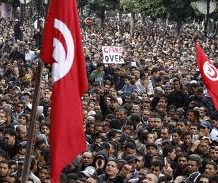Tunisia: why the progressives failed, and why the country will win

10 months after Tunisia elected its Constituent Assembly, one can now consider how the Islamists emerged victorious and analyze Tunisia’s chances for success. Ennahda, the Islamist party, captured 90 seats (or 41%) of the 217 up for election.
The Islamists’ prevailed because of:
- Discipline and expertise – Ennahda was ready to mobilize and act, making itself ever-present. Despite being repressed, the structure continued to function effectively; some of its leaders have been hardened by imprisonment, they are true political leaders.
- In Tunisia, like elsewhere in the Arab World, authoritarian regimes and repression only served to fuel religious sentiments.
- A desire to return to the Arab identity – the Islamists leveraged history and traditions, emphasizing their cultural identity (closely linked with religious feelings). All of this has a reassuring effect.
- Class inequality – Ennahda represents the people who are at odds with the small, westernized elite who have amassed fortunes.
Mistakes of the Progressives:
- They were caught by certain arrogance. Treating a part of the electorate as illiterate simpletons is a dangerous approach that only serves the extremists.
- They largely neglected the countryside, thus disappointing people who needed to connect faces to political promises. No one bothered to visit them. Ennahda did.
- Another mistake was demonizing Islamists, focusing the debate on secularism and making themselves appear sectarian.
- Some smaller parties forgot the main objective (election for a Constituent Assembly) and instead focused on political programmes rather than on their visions for society.
- They brought theology into the debate, opening up a topic that only the Islamists could win.
For the future: I’m optimistic, persuaded that this experiment will succeed and invigorate the country. Why?
- Firstly, repressing and excluding the religious right was constant source of instability. Thus, it was time to let them express themselves, participating in country’s policy making.
- Although Ennahda has 41% of the Assembly, there is still 59% of the country, which has not specifically said that conservative Islam is the way forward.
In conclusion, here is what we can expect: The Islamists are here to stay. They will dominate the political scene by holding onto a stable, however relative, majority, while the opposition remains strong (50-60%) but fragmented. Their ability to block will be considerable, magnified through the attention they get from north of the Mediterranean. The biggest challenge for the Islamists now is to show to their electorate that Islam and democracy are not incompatible.
The role of women: women will save the Tunisian revolution and democracy – not only those that are educated and urban, but also women from the countryside. We would be mistaken to underestimate their courage or to say that they know less about what is happening than their husbands. They can make the difference, provided that the Progressives are willing to capitalize on them.





